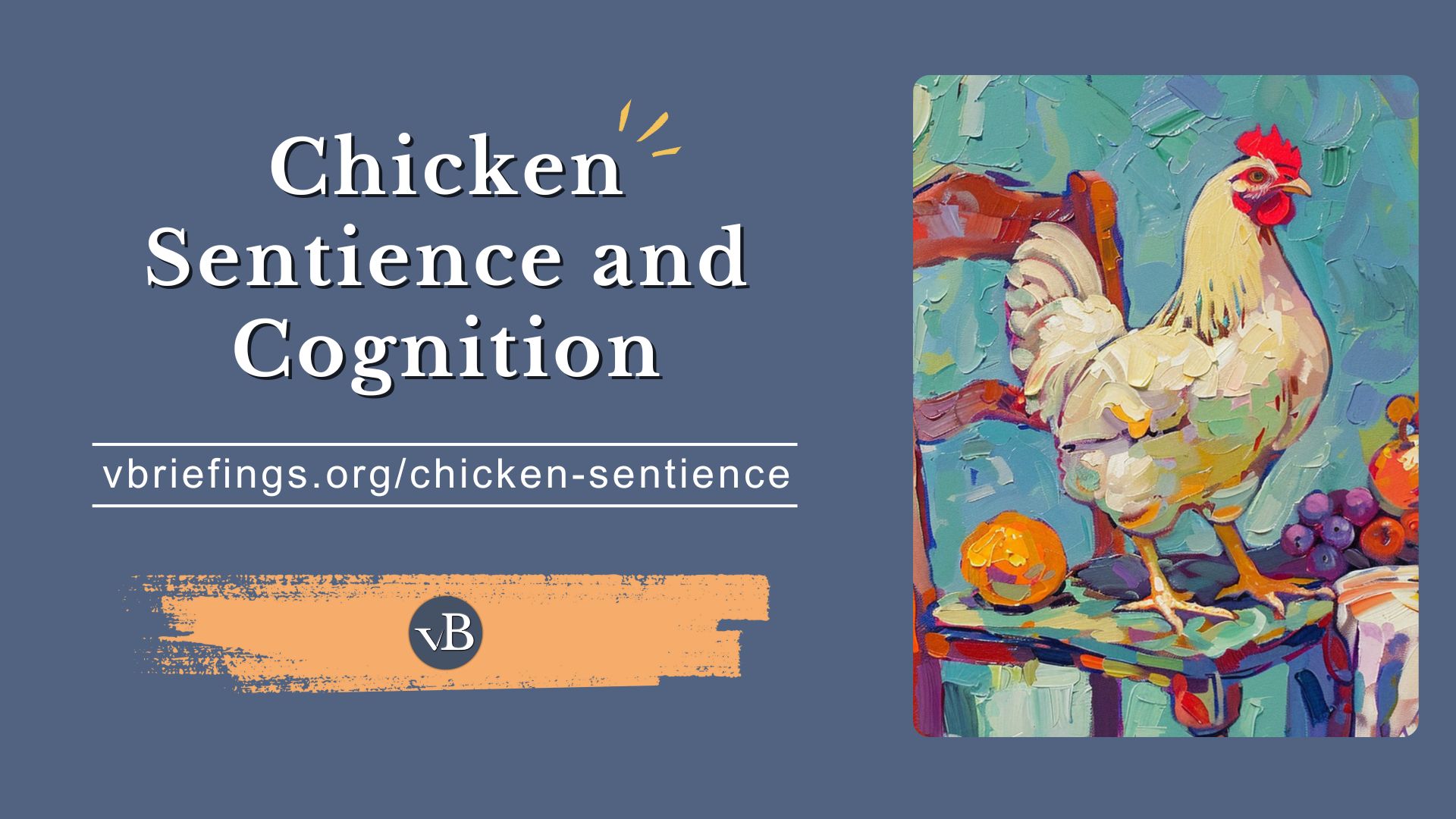Preface
Briefing description and more.
Chickens are sentient, are capable of complex mental processes, and lead rich cognitive, emotional, and psychological lives.
Companion Videos
How to use companion videos
Videos may be posted on multiple social media platforms, and you can share them on each platform according each platform’s conventions.
Share this Briefing
Social Media Sharing Image
This image will be used when sharing the briefing on a social media platform. You can see all social sharing images in the grid view.

How to share this briefing
Click on the icon for the platform on which you wish to share. What happens next depends on the platform, but generally a popup will appear, letting you add your own text as you share.
Briefing Meta
Metrics
Note: we will publish additional briefings after completing flashcards and presentation slides for selected briefings.
Counts:
| Main Text | |
| Key Points | 2 |
| Counterclaims | 1 |
| Supplementary | 1 |
| Further Study | 8 |
| Footnotes | 10 |
| Media & Advocacy | |
| Advocacy Notes | 12 |
| —Socratic Questions | 20 |
| Flashcards | 0 |
| Presentation Slides | 0 |
| Memes & Infographics | 0 |
| Companion Videos | 0 |
Other Meta:
Date Posted:
Last Edited:
Edit Log:
Key Points Links
Loading…
Help Us Improve
Please send your suggestions for improvements, or report any issues with this briefing to team@vbriefings.org
We appreciate that you are taking the time to help up improve. All suggestions and reports will be carefully considered.
Summary
A concise summary of the briefing (see below for citations).
Chickens are sentient beings with the ability to feel pain, experience emotions, and lead cognitively rich lives. Research shows that chickens not only experience emotions, but also have episodic memory, self-control, reasoning, self-awareness, and a sense of the future, as well as distinct personalities and basic math skills.
Context
Places this topic in its larger context.
Sentience is the capacity to feel pain and experience emotions. It is significant because it serves as the criterion for determining whether living beings deserve moral consideration.
While sentient beings have differing levels of intelligence, these differences in intelligence are not morally relevant, as discussed in our briefing on animal rights.
Key Points
This section provides talking points.
Chickens lead complex emotional lives, are behaviorally sophisticated, and have distinct personalities.
In the paper “Thinking chickens: a review of cognition, emotion, and behavior in the domestic chicken,” Lori Marino examined 266 research articles in 16 peer-reviewed journals and found that…1
- Chickens can experience happiness, boredom, and frustration.
- Chickens possess the capacity for episodic memory, which provides “evidence for an autobiographical sense of self in the past, present, and future.”
- Chickens exhibit self-control, a capacity not reliably found in humans until age four and is associated with self-awareness and autonomy—”the ability to think about and choose future outcomes.”
- Chickens are capable of reasoning and logical inference.
- Chickens are as “emotionally and socially complex as most other birds and mammals in many areas.”
- Chickens can perform simple math and understand the ordinality of numbers.
- Chickens have self-awareness—”a subjective awareness of one’s identity, one’s body, and one’s thoughts through time, distinguished from others.”
- Chickens are capable of a wide range of emotions, including happiness, fear, anxiety, boredom, and frustration.
- Chickens “are behaviorally sophisticated, discriminating among individuals, exhibiting Machiavellian-like social interactions, and learning socially in complex ways that are similar to humans.”
- Chickens “have distinct personalities, just like all animals who are cognitively, emotionally, and behaviorally complex individuals.”
Chickens have a sense of the future, can anticipate future events, and delay gratification.
Counterclaims
Responses to some yes but retorts.
Claim: Chickens are dumb—they have small brains.
Note: Differences in intelligence between humans and other animals are not morally relevant, as discussed in our briefing on animal rights.
Animal neurobiologist Leslie J Rogers, in comparing chickens to mammals, states that “recent findings challenge assumptions that have been made about brain size and the superiority of the mammalian line of evolution.”5
Animal neurobiologist Leslie J Rogers, in her book on the brain functions of chickens, says that “the cognitive abilities of some avian species may actually rival those of primates.”6
According to a 29-author research paper on avian brains published in a neuroscience journal, “many birds have cognitive proficiencies that are quite sophisticated, and some birds and mammals have cognitive proficiencies that clearly exceed all other birds or mammals.”7
Supplementary Info
Additional information that may prove useful.
General Information
- Hens do not need roosters to produce eggs. Hens will lay eggs whether or not a rooster is present. However, without a rooster, the eggs will be unfertilized and will not develop into chicks.
Further Study
Sources providing a deeper understanding of the topic or related topics.
Other Resources
This YouTube video titled “Chicken Society at Hens of the Hills,” gives you a fascinating glimpse into the lives of some rescue chickens, highlighting their sentience and social behaviors.8
This sentient article asks and answers “Are Chickens Smart?“9
The Marino article referenced above is open access: “Thinking chickens: a review of cognition, emotion, and behavior in the domestic chicken.” The article explores the cognitive, emotional, and social complexity of domestic chickens, showing that they possess advanced sensory abilities, episodic memory, self-control, and other sophisticated behaviors.10
Advocacy Resources
Information to help with outreach and advocacy.
Note: we will publish additional briefings after completing flashcards and presentation slides for selected briefings.
Share This Briefing
Cloned from the Preface Section on page load.
Companion Videos
Cloned from the Preface Section on page load.
Memes and Infographics
No images found.
How to use Memes and Infographics
To sequence through all memes and infographics on this page, click on any image than use the arrow keys or the arrow buttons to show next and previous images.
To share a meme or infographic, right click on the image and choose download or save as. Then upload the image to the platform of choice.
Presentation Slides
Slides not available.
How to Use the Presentation Slides
You can view the slideshow full screen by clicking on the first link above.
To use Canva presenter mode, view the speaker notes, or download the slides as PowerPoint, login to Canva (the free account works) and follow the Full Canva Link provided above.
To copy this presentation to your own Canva project, use the Full Canva Link provided above, then select File->Make a Copy from the upper left. You can build your own unique presentation from multiple briefings by copying the presentation from each briefing and then building another presentation from the copied presentations.
Flash Cards
We partner with Brainscape because of their excellent features for learning. You will need to create a free Brainscape account to study the cards.
Go to Flash Cards: This will take you to a list of decks.
About Flash Cards and Brainscape
Flash cards are here to help you commit important facts and concepts in this briefing to memory.
In Brainscape, there is one deck for each briefing. You can study more than one deck at a time. Brainscape uses spaced repetition to promote memory retention. It is “the secret to learning more while studying less.”
You can study using your browser, but Brainscape also has a free mobile app that makes learning anywhere easy.
Socratic Questions
Socratic-style questions are embedded in the Advocacy Notes below, and shown in italics.
These are open-ended, thought-provoking questions designed to encourage critical thinking, self-reflection, and deeper understanding. They are inspired by the Socratic method, a teaching technique attributed to the ancient Greek philosopher Socrates, who would ask his students probing questions rather than directly providing answers.
The goal is to help people examine their beliefs, clarify their thoughts, uncover assumptions, and explore the evidence and reasoning behind their ideas.
Advocacy Notes
Tips for Advocacy and Outreach
General Tops
People often dismiss chickens as unintelligent, unfeeling animals, assuming they lack complex emotions or reasoning abilities. Your goal is to challenge these misconceptions, highlight scientific evidence of their cognitive abilities, and shift their perspective toward seeing chickens as individuals who deserve moral consideration.
Show Why Sentience is More Important Than Intelligence
Even if people accept the overwhelming evidence that chickens are intelligent, they may still dismiss their suffering.
- “If we don’t judge a human’s right to be free from harm based on intelligence, why should we do that for chickens?”
- “Since intelligence doesn’t determine an animal’s capacity to suffer, why should it determine whether they deserve moral consideration?”
Why? This pushes them to recognize that sentience, not intelligence, is the basis for ethical concern.
Challenge the Assumption That Chickens Are Simple-Minded
Many people believe that chickens are unintelligent because they have small brains. Shift the focus to what intelligence actually means.
- “If intelligence is only about brain size, why do some birds display cognitive abilities that rival those of primates?”
- “Since chickens can reason, use logic, and even perform simple math, does that still sound like an unintelligent animal to you?”
Why? This forces them to reconsider their perception of intelligence and how it applies to chickens.
Highlight That Chickens Experience a Wide Range of Emotions
People may think chickens do not have emotional depth. Show them that chickens experience a broad spectrum of emotions.
- “Since chickens experience emotional responses based on their environment and social interactions, should we dismiss their suffering?”
- “If chickens can feel happiness, fear, frustration, and boredom, how are they different from the animals we already recognize as sentient?”
Why? This helps them see chickens as emotionally rich individuals rather than as mere food sources.
Show That Chickens Have Self-Awareness and Memory
Some may assume that chickens only live in the moment and have no sense of the past or future. Show that they have episodic memory and recognize themselves as individuals.
- “If a chicken can remember past experiences and anticipate future events, wouldn’t that suggest they have a sense of self?”
- “Since chickens can recognize themselves as distinct individuals and recall past interactions, should we continue treating them as mindless animals?”
Why? This disrupts the belief that chickens lack self-awareness.
Reveal That Chickens Can Delay Gratification and Make Decisions
Chickens demonstrate self-control and the ability to think about future outcomes—a sign of higher cognitive ability.
- “If chickens can weigh short-term versus long-term benefits and delay gratification, doesn’t that suggest a level of thoughtfulness?”
- “Why do we admire this ability in human children but ignore it in chickens?”
Why? This forces them to recognize that chickens are capable of making decisions beyond mere instinct.
Show That Chickens Understand Numbers and Logical Inference
People assume math and logical reasoning are unique to humans. Show them that chickens can understand numerical order and logical relationships.
- “What does it say about chickens’ intelligence when they can count, recognize sequences, and understand basic math?”
- “If an animal can determine numerical order and make logical inferences, does that suggest a level of intelligence we’ve been ignoring?”
Why? This challenges the assumption that chickens operate purely on instinct.
Challenge the Belief That Chickens Lack Social Sophistication
Chickens have complex social interactions, recognize individuals, and learn from one another.
- “Since chickens can form relationships, distinguish individuals, and even use social strategies, how can we say they are not socially intelligent?”
- “If chickens can learn from watching others and adapt their behavior accordingly, doesn’t that show they are far more sophisticated than we give them credit for?”
Why? This makes them reconsider how chickens interact and form bonds.
Expose the Myth That Chickens Are Indifferent to Their Environment
Some may believe that chickens don’t care about their surroundings and are fine in factory farms. Show that they actively engage with their environment and suffer when deprived of it.
- “If chickens become frustrated and bored when confined, doesn’t that mean they have preferences and desires like other animals?”
- “Why do we acknowledge that zoo animals need enrichment but ignore the same need for chickens?”
Why? This makes them see that chickens suffer when their mental and emotional needs are not met.
Address the Claim That Chickens Lack a Sense of the Future
People may assume that chickens only react to immediate stimuli. Show that they anticipate future events and plan accordingly.
- “Since chickens can anticipate future events and modify their behavior based on expected outcomes, doesn’t that show they have more awareness than we might have assumed?”
- “What does it mean when chickens show self-control and delay gratification for a better future outcome?”
Why? This disrupts the belief that chickens only act on impulse.
Leave Them With a Thought-Provoking Question
If they resist, don’t argue—leave them with something to consider.
- “Now that you know chickens have self-awareness, complex emotions, and intelligence, does that change the way you view them?”
- “If chickens were given the same opportunities to interact and learn as dogs, how differently would we perceive them?”
Why? A strong question stays with them long after the conversation ends.
Final Thoughts: Keep It Engaging and Challenging
Expose misconceptions. Many people underestimate chickens’ cognitive abilities simply because they’ve never thought about it.
Make it personal. Encourage them to reflect on how they judge intelligence and moral worth.
Reframe the conversation. The issue isn’t whether chickens are as smart as humans—it’s whether they can suffer and have preferences, which they clearly do.
Footnotes
Our sources, with links back to where they are used.
- Marino, Lori. “Thinking Chickens: A Review of Cognition, Emotion, and Behavior in the Domestic Chicken.” Animal Cognition 20, no. 2 (2017): 127–47. ↩︎
- Jennifer ViegasDiscovery News. “Chickens Worry about the Future. July 15, 2005. ↩︎
- Marino, Lori. “Thinking Chickens: A Review of Cognition, Emotion, and Behavior in the Domestic Chicken.” Animal Cognition20, no. 2 (2017): 127–47. ↩︎
- Abeyesinghe, S. M., C. J. Nicol, S. J. Hartnell, and C. M. Wathes. “Can Domestic Fowl, Gallus Gallus Domesticus, Show Self-Control?” Animal Behaviour 70, no. 1 (July 1, 2005): 1–11 ↩︎
- Rogers, Lesley J. The Development of Brain and Behaviour in the Chicken. CAB International, 1995. 214 ↩︎
- Rogers, Lesley J. The Development of Brain and Behaviour in the Chicken. CAB International, 1995. 214 ↩︎
- Jarvis, Erich D., Onur Güntürkün, Laura Bruce, András Csillag, Harvey Karten, Wayne Kuenzel, Loreta Medina, et al. “Avian Brains and a New Understanding of Vertebrate Brain Evolution.” Nature Reviews Neuroscience 6, no. 2 (February 2005): 9. ↩︎
- Sentient. “Chicken Society at Hens of the Hills.” YouTube, 27 Mar. 2020, youtu.be/Vmh-8oz27nc?si=DpzrDbYaEGsm7yWw. Accessed 5 July 2024. ↩︎
- Mishler, Jennifer. “Are Chickens Smart? Do Chickens Have Feelings?” Sentient Media, 2 Jan. 2017, sentientmedia.org/are-chickens-smart/. ↩︎
- Marino, Lori. “Thinking chickens: a review of cognition, emotion, and behavior in the domestic Chicken.” Animal Cognition 20, no. 2 (2017): 127–47. ↩︎




